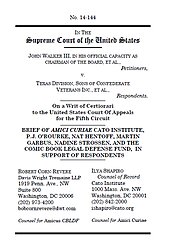Learn more about Cato’s Amicus Briefs Program.
Between 1861 and 1865, Texas was in a state of rebellion, waging war against the United States under the flag of the Confederacy. Texas has never offered any indication that it’s ashamed of this history. Indeed, the state recognizes April as Confederate History Month and spends January 19 celebrating Confederate Heroes Day. Yet now Texas is before the Supreme Court, arguing that its citizens’ sensibilities must be spared the sight of the Confederate flag in one particular context. The case involves a state agency that knows well what it is to cause universal offense: the Department of Motor Vehicles. Texas’s DMV, like that of many states, runs a program that allows private organizations such as charities, universities, and businesses to design their own “specialty” license plates—not to be confused with “vanity” plates, where the vehicle owner chooses the letters/numbers on her plate—which can then be purchased through the DMV. The current range of customized plates on offer in the Lone Star State include messages that are patriotic (“God Bless America”), fannish (“Dallas Cowboys”), socially conscious (“Be a Blood Donor”), commercial (“Dr. Pepper”), and completely immoral (“Young Lawyers”). These custom plates include a near-limitless variety of slogans, symbols, logos, and color patterns—something for everyone’s taste. Except the Sons of Confederate Veterans. Their design, which included a miniature depiction of the Confederate battle flag, was rejected by the DMV on the grounds that some members of the public would find it offensive. It’s certainly right about that—and the relevant statute authorizes the DMV to reject any design that “might be offensive to any member of the public”—but do we really want the government determining what’s “too offensive”? Texas argues that it can be as censorial as it wishes because it can’t be forced to promote speech that it disagrees with or finds offensive. Regardless of whether that’s true—Cato takes no position on the question of whether a specialty plate is a “quasi-public forum” or any other legalistic concept—it represents a remarkable and disturbing willingness to ban expression that’s fully protected by the First Amendment merely because it may offend. (This is not a case about obscenity, incitement, “true threat,” or one of the few other categories of unprotected speech.) Texas’s stance is particularly worrying given that it comes at a time when free speech is being threatened to an extent not seen in some time. Throughout Europe and the Anglosphere, liberal democracies are increasingly intolerant of offensive speech, enacting open-ended hate-speech laws, prohibitions on blasphemy, and “human rights” protections against insulting not just individuals but communities and abstract concepts. Domestically, Texas’s position mirrors that of many colleges and universities, whose coddling speech codes have rendered the idea of the campus as a place for vigorous and open academic discourse a laughable theory. So effective has this program of re-education been that. in a recent poll, nearly 40 percent of respondents believed that the First Amendment goes “too far” in protecting free speech—up from less than 20 percent just two years ago. Cato disagrees. Together with a team of expert offenders of good taste—and equally expert defenders of free speech—we have filed an amicus brief urging the Supreme Court to reaffirm that the First Amendment protects the speech of unpopular minorities, even when the proffered justification for censorship is its putative “offensiveness.” We argue that offensiveness is intrinsically valuable in the marketplace of ideas because it enables self-actualization and the freedom of association, among other important interests. Not only does the right to be offensive secure the livelihood of our favorite comedians, it protects scientific and medical researchers in their quest to push the limits of human knowledge into fields once considered taboo and enables one religion’s heretic to become another’s prophet. And should a member of a third faith, or no faith at all, wish to define himself as an iconoclast by mocking, degrading, or insulting that heretic cum prophet—be it Muhammed, L. Ron Hubbard, or Mark Steyn—that too, is protected by the First Amendment. There’s no “offensiveness” exception to the First Amendment and it would be insulting for the Supreme Court to allow Texas to tell us what’s offensive. Those who are offended shouldn’t have a veto over free expression and putative offenders should be judged in the court of public opinion.

This work is licensed under a Creative Commons Attribution-NonCommercial-ShareAlike 4.0 International License.



